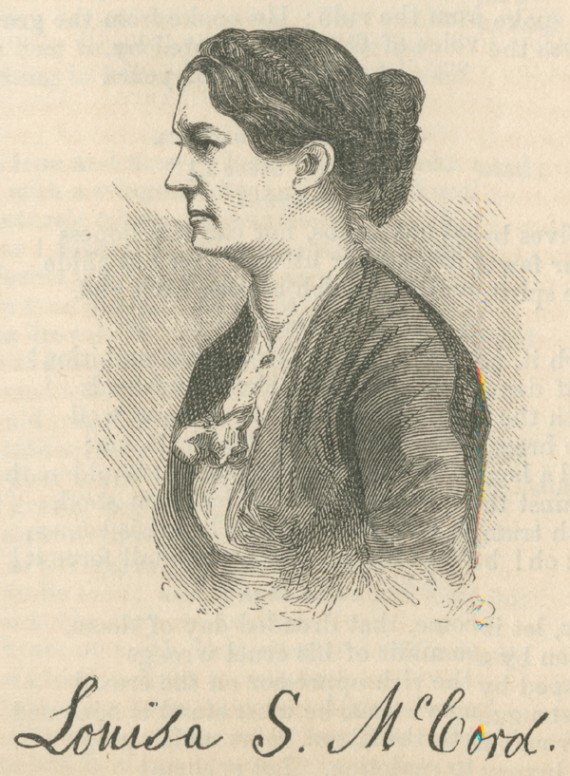
A series by Clyde Wilson.
LOUISA SUSANNAH CHEVES McCORD (1810—1879) of South Carolina was one of the most outstanding women of 19th century America. She was the daughter of Langdon Cheves, who had been Speaker of the U.S. House of Representatives and had held other important posts. In the antebellum period, while a plantation mistress, she published poetry, strong polemical essays in Southern reviews, a 5-act play (1851), and she made the first English language translation of the work of the French free market economist Frederic Bastiat (1848). During the war she was a mainstay of Confederate hospitals and poor relief in Columbia. Her Columbia house, which still stands, was ransacked but it was not burned in the destruction of Columbia because it was used as a headquarters by the odious Yankee general O.O. Howard. Presented here is a passage from her play Caius Gracchus. The complaints of the Roman tribune against the wealthy reflects the North’s arrogant exploitation of the South.
FROM THE ADDRESS OF GRACCHUS
In Act II, Scene VI.
Friends, brothers, Roman citizens, I come
As ye have willed it, that I may explain
And speak to you concerning your own rights.
Man has, in every station, rights his due.
Our slaves look to their masters for support.
The very claims we hold upon their labor
Make us a rule to tender them again
What comforts we can furnish to their lot.
If placed by circumstance, necessity,
Beneath our rule, protection thence we owe—
And he basely evading these, degrades
Himself below the thus defrauded slave.
You, Romans, have a sterner government;
For our rich nobles, who do make themselves
Perforce the country’s purse-holders, forget
To leave some portion of your gains for you
Whose toil and heart-ache won them. Are ye poor?
Why do your starving infants beg in vain
A hard, dry crust? Why are their shivering limbs
Wrapt but in rags, as they cower tearful round
The dying embers of your empty hearths?
Are there no vacant lands, the people’s due?
Where are the rich fields that your fathers conquered?
And where the exuberant harvests that yourselves
Have made Rome’s property? What justice gave them
New riches to the rich? The proud patrician
Who toiled not, bled not, in the gaining them;
Who sat at home by the fire and warmed himself
By talking over battles that you fought;
He waited for no law to make them his;
But by the strong hand of oppression seizes
The bread which should have fed your hungry babes.
Is there no corn in the market? You will find
A large abundance. There have lately been
New importations from the provinces.
Why do you starve, then? Why do you not buy?
You smile as though the bare idea were strange.
You cannot buy. You have no monies. Rich,
Usurious, the plunderer speculates
On your starvation. Beggars the which you are
His robberies make you, and he taunts you then,
Mocking your poverty by this display,
Showing how rich the country is in grain,
While he from hunger-clenched fingers, screws
To pay for a mere handful, your last doit!
With poverty your chilling bed-fellow,
And hugged by hunger, while ye thus are driven
To wrap ye in your rags and wait for death,
Who are those laborers, well-dressed, happy, sleek,
Tilling the fields which, citizens, are yours?
From the depopulated country fly
The shepherd and the husbandman, to make
Room for the rich man’s slave. Beasts have their dens,
They hide them in their caves, and there may rest;
But you, who in the cause of Italy
Your heart’s-blood spill, ye Roman citizens—
To you she gives no home! She leaves you nought
Save only God’s light and the air you breathe!
The poor man has no home; he claims no shed
’Neath which his huddling brats may gather them.
From place to place the forlorn things he drags
And with their mother lays them on the earth
There, where the soldier sleeps. What mockery then,
To call on such, ye generals of Rome,
And bid them fight for their domestic Gods,
Their homes and sepulchres! Their sepulchres!
Their fathers’ bones are scattered to the winds
And the patrician ploughs them through his fields,
Nor heeds plebeian graves! And yet they fight;
Plebeians fight and die. The Roman blood
Boils up in the combat and the victory’s won,
For what? That these proud rich may sit and revel
In some new luxury, some dear-bought pleasure,
While you, ye so-called masters of the world,
In your possession hold no foot of ground!
To your assistance you have summoned me;
And where the anxious thought you dared not word,
Your walls speak to me. Public monuments
In blotted and scrawled sentences implore
Succor to Rome. Dare ye then help yourselves?
On you I call, to make your effort too.







So glad to know of her. Beautiful.